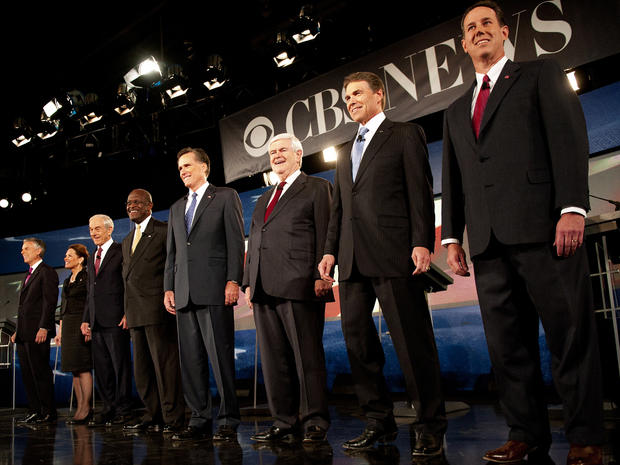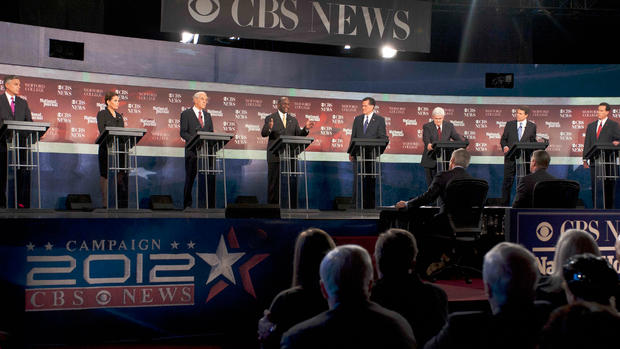Fact check: The CBS News/National Journal debate
The post originally appeared on NationalJournal.com. It was written by Yochi J. Dreazen, Sara Sorcher and Kevin Baron
PERRY
Texas Gov. Rick Perry tried to bolster his credibility on military issues by describing himself as a "commander in chief" of sorts - specifically, the commander-in-chief of the Texas National Guard, one of the largest such forces in the nation. Perry is correct in saying that he, as governor, made key decisions about when to call out the Guard in the case of natural disasters in his home state. But Perry's suggestion that he had some say in where the troops were deployed overseas is false. Over the past 10 years of war in Iraq and Afghanistan, the Pentagon has had complete control over the National Guard units of every state in the country, including Texas. The decisions about where to send those troops, what types of missions they should undertake, and how long they should remain overseas remained entirely with the president. The view of governors like Perry were irrelevant to those decisions.
GINGRICH
Newt Gingrich incorrectly said President Obama "dumped" U.S. ally Hosni Mubarak "overnight" amid mass protests demanding the end of his 30-year rule. And he said it's ironic that Syrian President Bashar al-Assad had received "amazingly soft treatment" as though the State Department was "afraid to make him feel bad." The Obama administration had initially refrained from calling publicly for Mubarak to step down, saying the decision was for the Egyptian people to make. Then Obama called on Assad to step down pointedly-- and the administration imposed a raft of sanctions meant to isolate Damascus from the U.S. financial system by freezing the Syrian government's assets under U.S. jurisdiction, banning U.S. imports of Syrian-origin petroleum and petroleum products, and banning Americans from engaging in any transaction involving the government of Syria.
More analysis from National Journal on the CBS/NJ debate:
Michael Hirsh: No one really measured up
Yochi Dreazen: GOP Candidates take aim at Obama, but also hit Bush
Ron Fournier: GOP Field Hard-line, Isolationist and Unclear
George Condon: Perry Takes a Page from The Gipper
BACHMANN
Minnesota Rep. Michele Bachmann's statement that U.S. intelligence operatives have no place to detain captured terrorists is false. The Bush administration operated a network of secret prisons in Afghanistan and eastern Europe, but it began closing down the European facilities before handing power to President Obama. Under Obama's watch, the U.S. has maintained - and expanded - the size of its secretive prisons in Afghanistan; opened up new detention facilities on the island of Diego Garcia; and opened up new facilities in the African nation of Somalia. In addition, the Guantanamo Bay detention facility remains open, and terror suspects held there continue to be interrogated.
Bachmann also claimed President Obama has been more of a friend to Occupy Wall Street protesters than to Israel. This is a subjective, if not misleading statement. Obama has maintained U.S. aid to Israel, including military aid and sales, and at the United Nations in September said the bond was "unshakable." Obama and his national security leaders like Defense Secretaries Robert Gates and Leon Panetta have consistently lauded U.S. support for Israel, against the Iranian threat. What Republicans want is for the U.S. to take Israel's side in a much more robust way.
CAIN
In explaining his strategy for dealing with Iran, Republican presidential candidate Herman Cain said the U.S. should rid itself of dependence on Middle East oil. But the U.S. does not accept Iranian oil, due to its economic embargo. Iran is the world's fifth-largest oil producer. The U.S. has not enforced to the fullest extent possible existing laws that could punish foreign companies working with the Iranian oil industry.
Transcript of the debate
Full video
Full coverage: The CBS News/National Journal debate
:
GOP candidates on Pakistan: Friend or foe?
Perry: All countries start at zero foreign aid
Bachmann on increasing military spending
Cain on dealing with the Arab Spring
Post-debate analysis with CBS News political director John Dickerson

